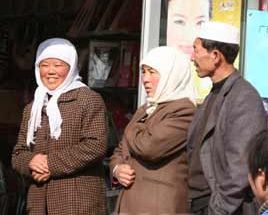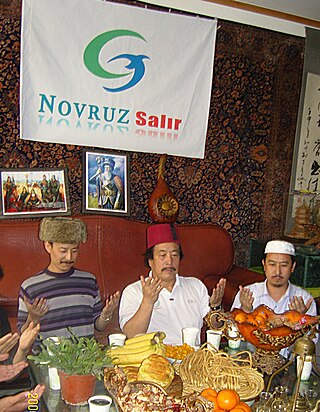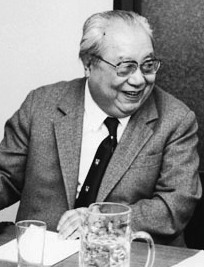Related Research Articles

Shen Dehong, known by the pen name of Mao Dun, was a Chinese essayist, journalist, novelist, and playwright. Mao Dun, as a 20th-century Chinese novelist, literary and cultural critic, and Minister of Culture (1949–65), was one of the most celebrated left-wing realist novelists of modern China. His most famous work is Midnight (子夜), a novel depicting life in cosmopolitan Shanghai. It is also considered to be the work with the greatest influence on his future writing. Furthermore, during the period in which he was writing Midnight, Mao Dun formed a strong friendship with another of China's most famous writers, Lu Xun.

The Hui people are an East Asian ethnoreligious group predominantly composed of Chinese-speaking adherents of Islam. They are distributed throughout China, mainly in the northwestern provinces and in the Zhongyuan region. According to the 2011 census, China is home to approximately 10.5 million Hui people. The 110,000 Dungan people of Kazakhstan and Kyrgyzstan are also considered part of the Hui ethnicity.
The history of Chinese literature extends thousands of years, from the earliest recorded dynastic court archives to the mature vernacular fiction novels that arose during the Ming dynasty to entertain the masses of literate Chinese. The introduction of widespread woodblock printing during the Tang dynasty (618–907) and the invention of movable type printing by Bi Sheng (990–1051) during the Song dynasty (960–1279) rapidly spread written knowledge throughout China. In more modern times, the author Lu Xun (1881–1936) is considered an influential voice of baihua literature in China.

Yao Wenyuan was a Chinese literary critic, a politician, and a member of the Gang of Four during China's Cultural Revolution.

Hui pan-nationalism refers to the common identity among diverse communities of Chinese-speaking Muslims. Hui pan-nationalism should be distinguished from nationalist sentiments by minority groups who are also Muslim such as those of the Uyghurs. These sentiments are grounded upon the Hui "zealously preserving and protecting their identity as enclaves ensconced in the dominant Han society." In exchange for support during the Cultural Revolution, the Hui were granted high political participation. Hui pan-nationalism was one of the first sources of modern Chinese nationalism, influenced by Western, Japanese and Soviet influences.

The Dongxiang people are Mongolic people and one of 56 ethnic groups officially recognized by the People's Republic of China. Most of the Dongxiang live in the Linxia Hui Autonomous Prefecture and surrounding areas of Gansu Province in Northwestern China, half of them in Dongxiang Autonomous County, which is part of Linxia. According to the 2010 census, their population numbers 621,500, although research has found that the number is inflated due to Hui identifying themselves as Dongxiang for the census, in order to benefit from minority policies.

The Salar people are a Turkic ethnic minority of China who largely speak the Salar language, an Oghuz language. The Salar people numbered 130,607 people in the last census of 2010.

Fei Xiaotong or Fei Hsiao-tung was a Chinese anthropologist and sociologist. He was a pioneering researcher and professor of sociology and anthropology; he was also noted for his studies in the study of China's ethnic groups as well as a social activist. Starting in the late 1930s, he and his colleagues established Chinese sociology and his works were instrumental in laying a foundation for the development of sociological and anthropological studies in China, as well as in introducing social and cultural phenomena of China to the international community. His last post before his death in 2005 was as Professor of Sociology at Peking University.
Jews and Judaism in China are predominantly composed of Sephardi Jews and their descendants. Other Jewish ethnic divisions are also represented, including Ashkenazi Jews, Mizrahi Jews and a number of converts.

The Book of Han or History of the Former Han is a history of China finished in 111AD, covering the Western, or Former Han dynasty from the first emperor in 206 BCE to the fall of Wang Mang in 23 CE. It is also called the Book of Former Han.

Zhou Wei Hui, known simply by her Chinese given name Wei Hui, is a Chinese Post 70s Generation writer, living and working in Shanghai and New York City. Her novel Shanghai Baby (上海宝贝) (1999) was banned in the People's Republic of China as "decadent". Her latest novel Marrying Buddha (我的禅) (2005) was censored, modified and published in China under a modified title. She is often associated with Mian Mian, another slightly older member of the "New Generation".

Yusuf Ma Dexin was a Hui Chinese Hanafi-Maturidi scholar from Yunnan, known for his fluency and proficiency in both Arabic and Persian, and for his knowledge of Islam. He also went by the Chinese name Ma Fuchu. He used the Arabic name Abd al-Qayyum Ruh al-Din Yusuf. He was also styled as "Mawlana al-Hajj Yusuf Ruh al-Din Ma Fujuh".
The literary inquisition, also known as speech crime (以言入罪), refers to official persecution of intellectuals for their writings in China. The Hanyu Da Cidian defines it as "the ruler deliberately extracts words or phrases from intellectual's writings and arbitrarily accuse him in order to persecute him" ("旧时谓统治者为迫害知识分子,故意从其著作中摘取字句,罗织成罪"). The Inquisition took place under each of the dynasties ruling China, although the Qing was particularly notorious for the practice. In general, there are two ways a literary inquisition could be carried out. First is that the conviction came from the writing itself. That is, the writing was the direct cause of the persecution. The second is that the writing was used as a tool to provide legitimate evidence for a predetermined conviction. Such persecutions could owe even to a single phrase or word which the ruler considered offensive. Some of these were due to the naming taboo, such as writing a Chinese character that was part of the emperor's personal name. In the most serious cases, not only the writer, but also their immediate and extended families, as well as those close to them, would also be implicated and killed.
David Der-wei Wang is a literary historian, critic, and the Edward C. Henderson Professor of Chinese Literature at Harvard University. He has written extensively on post-late Qing Chinese fiction, comparative literary theory, colonial and modern Taiwanese literature, diasporic literature, Chinese Malay literature, Sinophone literature, and Chinese intellectuals and artists in the 20th century. His notions such as "repressed modernities", "post-loyalism", and "modern lyrical tradition" are instrumental and widely discussed in the field of Chinese literary studies.

Shanghai Baby is a semi-autobiographical novel written by Chinese author Wei Hui. It was originally published in China in 1999. The English translation was published in 2001.

Marrying Buddha is the second novel by Chinese author Wei Hui and is a sequel to her first published novel, Shanghai Baby. The English translation was made in 2005.

Huang Xianfan was a Zhuang Chinese historian, ethnologist and educator.
Li Jihong is a Chinese poet, literary translator and critic. He is known for his literary translations, which includes the Chinese editions of The Kite Runner, Conversations with God, A Thousand Splendid Suns, The Fall of Public Man and many others.
Post 70s Generation is a literary critical term in Chinese contemporary literature, which refers to the new generation of writers who were born after 1970 in China. In some criticism these writers have also been described as the 'Post Cultural Revolution Generation', or 'Post Maoism Generation' as they grew up after Mao's death.

Lie Loan Lian Nio was one of the earliest known woman translators of Chinese language novels into Malay in the Dutch East Indies. She was active in the 1920s and mostly translated for the magazine Tjerita Baroe.
References
- ↑ "How a writer gives voice to China’s ethnic minorities by translating their stories Linguist and Chinese literary translator" - by Thomas Bird, South China Morning Post Magazine, 22 June 2018. https://www.scmp.com/magazines/post-magazine/long-reads/article/2151751/how-writer-gives-voice-chinas-ethnic-minorities - retrieved 31 July 2018
- ↑ "Shanghai Baby".
- ↑ "Subscribe to read". Financial Times.
{{cite web}}: Cite uses generic title (help)